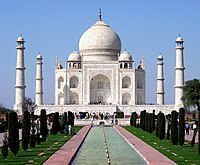Chini Ka Rauza
The outer walls of the monument is decorated with glazed tile and hence the name Chini ka Rauza (the word chini coming from China).
History

Also known as China Tomb, this is the mausoleum of Afzal Khan who was a Persian poet during the reign of Jahangir. Later he became the wazir during Shah Jahan's reign. Khan died in Lahore in 1639 and was buried here at Agra. The tomb is built facing the city of Mecca.
Architecture
The structure's architectural style is unusual because of the exotic architectural style and is unusually plain possessing a sultanate style unproportional dome.
Due to the inclement weather, the various types of enamel colours have worn away from the tiles. In the facades, the builders used earthenware pots to reduce the weight of the concrete filling which was followed in Rome and Egypt.
The interior houses two graves (Afzal Khan and his wife) along with brightly painted walls and ceilings. It stands in the centre of a Charbagh styled garden overlooking the Yamuna.
-
Damaged yet intricate pietra dura inlay work at Chini Ka Rauza
-
Interior view
See also
References
- ^ Datta, Rangan (5 July 2024). "Agra beyond the Taj: Exploring tombs and gardens on the left bank of Yamuna". The Telegraph. My Kolkata. Retrieved 18 July 2024.
- ^ Stephen Meredyth Edwardes (1930). Mughal Rule in India. Atlantic Publishers & Dist. pp. 332–. ISBN 978-81-7156-551-1.
- ^ Havell, p.92
Notes
- Ernest Binfield Havell. A Handbook to Agra and the Taj, Sikandra, Fatehpur-Sikri, and the Neighbourhood. Asian Educational Services. ISBN 9788120617117.
- Lucy Peck. Agra: The Architectural Heritage. Roli Books Private Limited. ISBN 9788174369420.
External links
27°12′03″N 78°02′03″E / 27.20083°N 78.03417°E


